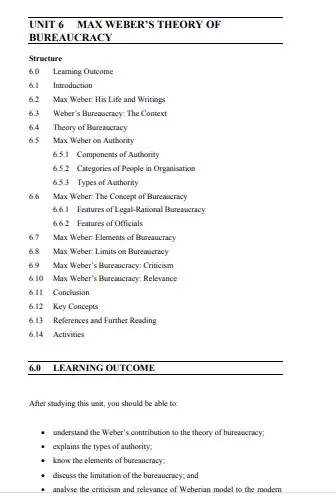‘Max Weber Theory of Bureaucracy’ PDF Quick download link is given at the bottom of this article. You can see the PDF demo, size of the PDF, page numbers, and direct download Free PDF of ‘Concept of Bureaucracy By Max Weber’ using the download button.
Max Weber Theory of Bureaucracy Book PDF Free Download

Max Weber’s Theory of Bureaucracy
Max Weber (1864-1920) was born in western Germany. He studied law at the University of Heidelberg.
He joined the University of Berlin as an instructor in law. He wrote several papers on law, and social, political, and economic factors prevalent during that time.
His major writings were, ‘The Theory of Economic and Social Organisations’, ‘General Economic History’, and ‘Protestant Ethic and Spirit of Capitalism (1904).
He studied law and economics and he became a specialist in the interpretation of religious doctrines and he was a notable biblical scholar.
He had a thorough grasp of ancient Roman administration, medieval trading companies, and the modern stock exchange.
He became a specialist in the comparative history of urban institutions. He also made a special study of the social and psychological conditions of productivity in a West German textile mill.
He studied the methodology of social studies. Weber always preferred knowledge obtained through practical experience to library research.
His writings reflect the social conditions of Germany of his time. He saw the decline of liberalism and the threat to an individual in the bureaucratization of society.
The unification of Germany under Bismarck and the elimination of the liberal middle-class movement convinced Weber that the great goal could be achieved through power policies. (Prasad. et.al. p.77)
WEBER’S BUREAUCRACY
THE CONTEXT Scientific management and the theory of bureaucracy mark the first major developments in the theory of organization.
These theories were responding to the needs of industrial organizations. The theory of bureaucracy was needed to bring efficiency in its functioning.
As stated by Weber ‘no special proof is necessary to show that military discipline is an ideal model for the modern capitalist factory. (Clegg and Dunkerley, p.75).
The example of the most developed form of organization, bureaucracy, the theory of which Weber found, is developed from the Prussian military forces, and which enterprises such as the British Railway Companies found in the ranks of the British Army, was to become the specific form of management of big business.
Weber felt that the emergence of the modern bureaucratic organization is ‘demanded’, he further says ‘a peculiarity of modern culture’, and specific of its technical and economic basis, demands the very ‘calculability of results’ (Clegg and Dunkerley, p.81).
More specifically ‘today it is primarily the capitalist market economy which demands the official business of the administration be discharged precisely, unambiguously, continuously, and with as much speed as possible’ (Clegg and Dunkerley, p.80.)
Bureaucratization offers above all, the optimum possibility for carrying through the principle of specializing administration functioning according to purely objective considerations. (Clegg and Dunkerley, p.80).
The above lines show that Weber’s theory of bureaucracy was a response to the demands of the industrial capitalist economy, which required an efficient administration.
While Taylor attempted to rationalize the functions of a modern factory, Weber attempted the rationalization of bureaucratic structures. Both of them emphasized control and discipline in the working of organizations.
Theory of Bureaucracy
Bureaucracy was discussed before Weber’s writings. The invention of the word bureaucracy belongs to Vincent de Journey, a French economist in 1745.
He took the conventional term ‘bureau’ meaning writing-table and office, and added to it the word derived from the Greek suffix for the ‘rule’, to signify bureaucracy as the rule of officials.
It rapidly became a standard and accepted term in the conventions of political discourse. (Clegg and Dunkerley, p.75).
By the end of the 19th century, the term was widely held to have been of German origin. J.S. Mill, an eminent political scientist included bureaucracy in his series of analyses. Karl Marx also discussed bureaucracy in certain places.
According to Marx, bureaucracy like a state itself is an instrument by which the dominant class exercises its domination over the other social classes. (Mohit Bhattacharya, p.52).
Hegel conceived the governing bureaucracy of public administration as a bridge between the state and civil society.
Bureaucracy as an institution existed in China even in the period of 186 B.C, public offices were in existence and persons for those offices were recruited through competitive examinations even then. (Prasad et. al. p.79).
The above discussion shows that there existed a bureaucracy much earlier than Weberian writings and there were attempts to understand the bureaucracy by different writings.
However Weber is considered to be the first person to attempt a systematic understanding of bureaucracy.
Related PDFs
- Trait And Type Theories of Personality PDF
- Alfred’s Essentials of Music Theory PDF
- Methods of Enquiry In Psychology PDF
| Author | – |
| Language | English |
| No. of Pages | 17 |
| PDF Size | 0.1 MB |
| Category | Education |
| Source/Credits | egyankosh.ac.in |
Meaning And Concept of Education PDF
How To Study ABROAD In Canada PDF
Lesson Planning in Primary and Secondary PDF
How To Study ABROAD In Canada PDF
Max Weber Theory of Bureaucracy PDF Free Download
